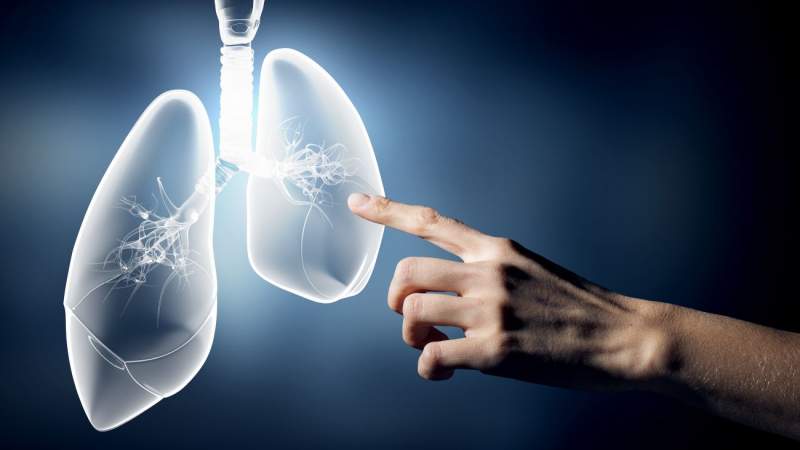Lung cancer is one of the most common forms of cancer. One in every 16 people will be diagnosed with the disease in their lifetime, and a new diagnosis happens every two minutes. Anyone can develop lung cancer, but people who smoke or are exposed to secondhand smoke and other harmful substances are at a greater risk.
Early Signs of Lung Cancer
The earlier the diagnosis, the greater the survival rate is for lung cancer. Being aware of the signs and symptoms of the disease will help you recognize it in yourself or a loved one before it spreads.
Pain is often one of the earliest symptoms of lung cancer, but it can come in many different forms. Some people experience chest pain when breathing, and others feel pain in their bones. About 25 percent of people with lung cancer experience back pain, which can happen when a tumor places direct pressure on the back or spine. Cancer can also cause irritation in the lining of the lungs, leading to sharp pain in the chest or back.
Headaches are a common symptom of lung cancer as well. This sometimes occurs when a tumor puts pressure on the superior vena cava, the vein that carries blood to the heart from the upper body. In other cases, headaches are a result of orthostatic hypotension or a drop in blood pressure upon standing, which is common in people with lung cancer.
Weight Changes
About 60 percent of people with lung cancer have experienced significant weight loss by the time they’re diagnosed. Loss of appetite is typically one of the earliest symptoms of the disease, but it can have serious consequences. Weight loss and malnutrition can put you at risk for a variety of other symptoms and health issues and can make it more difficult for your body to fight the cancer.
Many people don’t think much of weight loss and loss of appetite, but it’s sometimes a sign of a more serious issue. After a lung cancer diagnosis, weight loss often continues as chemotherapy and other treatments can cause nausea and vomiting. The psychological distress of a cancer diagnosis can affect your appetite, too.
Change in Cough
Coughing is your body’s way of clearing out germs, irritants, and other harmful objects from your lungs and throat. There are many causes of coughing other than lung cancer, but a cough caused by a cold or infection will clear up in a couple weeks. Almost everyone with lung cancer experiences an aggressive, persistent cough.
A cough caused by lung cancer may also sound different from your normal cough. It might sound deeper or more hoarse than usual, and it might be accompanied by blood or rust-colored phlegm. If you experience any of these symptoms, you should speak to your doctor right away.
Wheezing and Shortness of Breath
Wheezing is a whistling noise that occurs during breathing, and it affects anywhere from 40 to 85 percent of people with lung cancer. It often occurs in late stage lung cancer, but it can also be an early sign of the disease. Wheezing is caused by inflamed, blocked, or constricted airways. In many cases, it’s benign or easily treatable, but it sometimes indicates lung cancer.
Shortness of breath is another early sign of cancer. It’s normal to become winded when exerting yourself, but you may notice that you get out of breath much more easily than you used to. You may start to struggle to walk up a flight of stairs without losing your breath, which is a sign that you should see your doctor.
Raspy Voice
Hoarseness is especially common in people who have a persistent cough. You may hear a change in your voice, or others may point it out to you. A raspy voice can also be caused by weakness or paralysis in the laryngeal nerve, which controls the larynx. The laryngeal nerve passes through the chest cavity near the lungs, so a tumor in the lungs can affect the functioning of the nerve.
Like many of the other early signs of lung cancer, hoarseness can be caused by a variety of other factors. However, if it persists for more than two weeks, it may indicate cancer or another serious medical issue.
Treatment Options
If you’re diagnosed with lung cancer, you and your doctor will decide on a treatment plan. The best plan for you depends on the stage of the cancer, your symptoms, your overall health, and your preferences.
Here are some of the most common lung cancer treatments:
Surgery
Surgery is a popular treatment option for non-small cell lung cancer, but it tends to be most successful in the early stages of the disease. The goal is to remove the cancerous cells, and it’s often done in combination with other treatments.
There are several different types of lung surgery to remove cancer. A pneumonectomy removes an entire lung, which is sometimes necessary when the tumor is near the center of your chest. A lobectomy removes one of the five lobes of your lungs. A segmentectomy removes part of a lobe, and a sleeve resection removes part of the airway.
Chemotherapy
Chemotherapy can be an effective treatment for small cell and non-small cell lung cancer. It involves oral or IV anti-cancer drugs that enter the bloodstream and stop the spread of cancer cells.
Some of the most common chemotherapy drugs used to treat lung cancer include the following:
- Cisplatin
- Carboplatin
- Paclitaxel
- Docetaxel
- Irinotecan
- Vinblastine
- Radiation
Radiation therapy uses powerful X-rays to kill cancer cells or prevent them from spreading. The radiation used in lung cancer treatment usually comes from outside of the body, but in some cases, radioactive materials are placed inside of the tumor. The treatment is often used before or after surgery to shrink the tumor or remove remaining cancer cells.
Targeted Therapy
Targeted therapy is similar to chemotherapy, but it specifically attacks cancer cells, not other body cells. The purpose of the treatment is to interfere with the proteins and genes responsible for the tumor’s growth, which will stop the cancer from spreading.
The following are some of the most common types of targeted therapy:
- Hormone therapies
- Signal transduction inhibitors
- Gene expression modulators
- Toxin delivery molecules
Immunotherapy
Immunotherapy is a popular treatment for certain types of non-small cell lung cancer. The purpose of immunotherapy is to encourage your own immune system to kill cancer cells more efficiently. Your immune cells contain molecules that have to be turned on or off for an immune response to happen, and immunotherapy drugs target these molecules to stimulate your immune system and help it fight off the cancer cells.
Do Your Research
There are many options for treating lung cancer — especially if you and your doctor catch the disease early. Many patients are able to manage their symptoms and prevent or delay the spread of the cancer by using a combination of medications and therapies. If you’ve been diagnosed with lung cancer, you should carefully research your options and speak to your doctor about all possible treatments.





